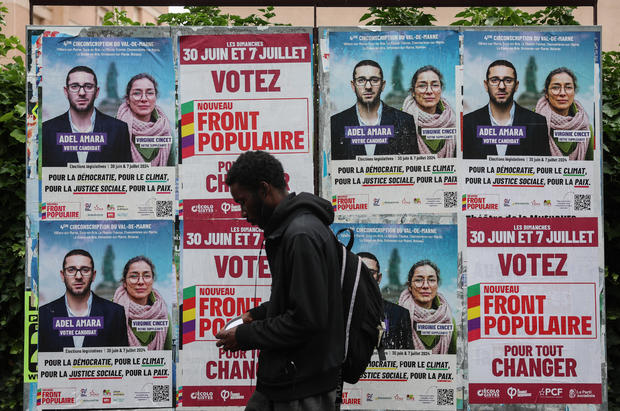Candidates in pivotal French legislative elections drop out in tactical move ahead of final vote
Paris - As France prepares for a decisive second-round vote Sunday, political parties from all persuasions are scrambling to secure seats in the National Assembly. However, more than 200 candidates - mostly from left and centrist parties - have dropped out in a tactical move to block the far right.
Marine Le Pen's far-right National Rally (RN) party and its allies led the first round vote with 33.4%. However, after the significant number of withdrawals to avoid splitting the vote against the far right, it's unlikely the RN can secure an absolute majority in this second round and form a government.
The RN is anti-immigration and has been accused of being antisemitic and anti-Muslim. It wants to roll back the power of the European Union in France and has threatened to pull the country out of the U.S.-led NATO military alliance.
There are 577 seats in the National Assembly, the lower house of parliament. Just 76 deputies were elected with an outright majority in the first round so the majority of seats are still up for grabs. A total of 289 seats is needed for that crucial absolute majority.
Final opinion polls on Friday predicted the RN and its allies would again lead the field - but would now only secure between 175 and 205 seats, well below the majority needed to form a government on their own, and below predictions in the immediate aftermath of the first round. However, that is more than double the number of seats held before these elections.

The leftist group, Nouveau Front populaire, or New Popular Front, is predicted to take between 145 and 175 seats. That grouping of traditional left, hard left and green parties was hastily formed after President Emmanuel Macron called snap elections in June.
Macron hoped to rally voters against the far right after the RN did well in early June elections for the European parliament, which governs the European Union.
However, political analyst Douglas Webber told CBS News: "President Macron made a colossal error in judgment".
His Ensemble - Together - centrist coalition for these parliamentary elections is tipped to win just 145-175 seats.
Polls predict voter turnout for this second round will be as high as 65%. That's similar to the numbers for the first round on June 30. Turnout was unusually high as many voters said they either wanted to block the far-right, or just get rid of Macron's government.
"Right now, we have big problems with the right wing," said one young woman after the first round vote. "We want more democracy, you know, we don't want people to feel afraid or scared about living in France."
These elections have been marred by attacks on candidates. The interior ministry said 51 candidates or party activists – from different parties – were attacked during the short campaign. For Sunday's vote, 30,000 police have been drafted in case of violence during polling or after the results are announced.
Initial predictions will be available shortly after the polls close in France on Sunday night. However, in the absence of an outright majority for one party or grouping, it may be days - or even weeks - before a government emerges.
RN president Jordan Bardella - who wants to be prime minister - has suggested that he would refuse to form a government if his party and allies do not win an outright majority. He argued that without a majority, his government could achieve little and, therefore, would not be worth it. Whether that is simply posturing to encourage all far-right supporters to vote in large numbers remains to be seen.
There is talk of a rainbow coalition of traditional left and right parties and centrists. But Macron made it clear on Wednesday at a meeting with his Council of Ministers, that blocking the far right did not mean that he would name a government led by the hard left LFI - La France Insoumise, or France Unbowed - led by Jean-Luc Melenchon. It remains to be seen if there would be enough deputies without the two extremes to form a government.
There is a third option. President Macron could decide to postpone forming a new government until after the Paris 2024 Olympic Games, which open on July 26. He could ask the current Prime Minister Gabriel Attal to continue in a caretaker role and then deal with the fallout of the elections once the Games are over.
- In:
- Emmanuel Macron
- France
Elaine Cobbe is a CBS News correspondent based in Paris. A veteran journalist with more than 20 years of experience covering international events, Cobbe reports for CBS News' television, radio and digital platforms.
Disclaimer: The copyright of this article belongs to the original author. Reposting this article is solely for the purpose of information dissemination and does not constitute any investment advice. If there is any infringement, please contact us immediately. We will make corrections or deletions as necessary. Thank you.







